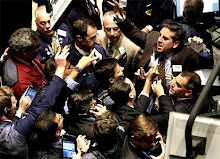With nobody willing to step in front of the runaway freight train on Wall Street, market pros are left with an ironically vexing problem: How do you make money in a market that just keeps moving in the same direction?
It's not as easy as it sounds.
Low volatility might sound like an investor's dream, but it wreaks havoc with advisors and traders who count on market gyrations and use corresponding hedging strategies.
The problem isn't just Wall Street's: Portfolio managers who use long-short strategies for their clients have been affected by the market's lack of volatility, potentially hurting returns for individual investors.
The market's inexorable march higher, in which the Standard & Poor's 500 (INDEX: .SPX) has traded above its 50-day moving average for 111 straight sessions, in some respects has made investing much more complicated.
"Try being a strategist," says Rick Bensignor, chief market strategist at Dahlman Rose in New York. "It's frustrating that the market continually sees a bid. We know that we're playing a game that is somewhat rigged...But the sustainability is evident and can continue to be evident for a while."
The market, particularly in the past eight months, has been remarkably boring, only recently breaking a correlation trend that had seen most stocks, and in fact most asset classes, move tightly in the same direction.
Just one in five sessions have seen moves of more than 100 Dow points in either direction, and about one in 20 has seen a swing of 200 points.
For options players and high-speed traders, such a stoic climb, rather than creating a comfort zone, actually can make for a difficult environment.
It might sound like a nice problem to have, but that's not necessarily the case.
"As the market has marched higher, volatility has come off. It's made the chore of hedging a portfolio cheaper," says Andrew Wilkinson, senior strategist at Interactive Brokers. "But the runup in the market has made that need redundant."
The only consolation for those using options-such as equity puts and calls and plays on the now-listless CBOE Volatility Index (Market Data Express: VIX)-has been a nice run in mergers and acquisitions, which has caused some momentary spikes in stock prices.
"Probably a decent amount of money has been made by trying to target at the very least big movements in certain stocks that have become takeover targets," Wilkinson says. "It depends on how well-tuned you are in spotting stocks that are takeover candidates. When you have no volatility, M&A is a good substitute."
Like many other strategists, Wilkinson is anticipating a pullback soon, and possibly a violent one considering how far and fast the market has risen.
To reference such a dramatic two-year move in the Dow, one would have to go back to the Great Depression, when the market doubled from March 14, 1935 to March 10, 1937. Of course, the aftermath from that wasn't pleasant.
"The downturn might have been felt a lot more, but it was not historically as quick," says Howard Silverblatt, senior index analyst at Standard & Poor's. "This bounceback is stronger and quicker than any of the historical rebounds that we've seen thus far within bull and bear markets."
The issue of a correction has been vexing to many strategists who felt that the recent turmoil in Egypt, and the Jan. 28 selloff in the market, would provide the perfect opportunity for the market to catch its breath.
"We've definitely had opportunities, that being a key one," Silverblatt says. "I wouldn't be shocked or dismayed for some kind of retraction. We've come a long way without people pulling back. But as long as we see earnings going strong and sales do not tank, what's going to be the catalyst?"
Earnings have turned in a respectable performance, with about 70 percent of companies beating on both bottom line profit and top-line revenue.
At the same time, a rise in interest rates has proven no deterrent to stock investors, nor has the continuing threat of more upheaval in the Middle East.
Those who believe the market is overheated cite Dow Theory which states that a rally must be confirmed by the transport sector, which has not happened. The Dow is up about 4 percent since Jan. 13, while the transports have fallen 2.8 percent.
Yet the bull market cycle has kept going and pushed the bears further out into the cold.
"Any bear feels uncomfortable right now. They put us under the spotlight," says Kathy Boyle, president of Chapin Hill Advisors in New York. "To me this just feels like a bunch of elephants trying to herd through a door. It's getting very peaky."
Ultimately, finding that correction and using it to collect profits and plot strategy going forward will be the only thing that soothes those who have been caught looking for a pullback and not getting one.
But for now, fighting the bullish tape seems a losing game as well.
"It's a game of musical chairs, and I don't want to be the one standing without a chair," Boyle says.
"The market as a discounting mechanism has just been marching toward trouble for some time," Wilkinson adds. "So it wouldn't surprise me to see it pull back. Earnings are doing fine and you can't complain. But who ever knows when valuation is appropriate
Wednesday, February 9, 2011
Subscribe to:
Post Comments (Atom)


No comments:
Post a Comment